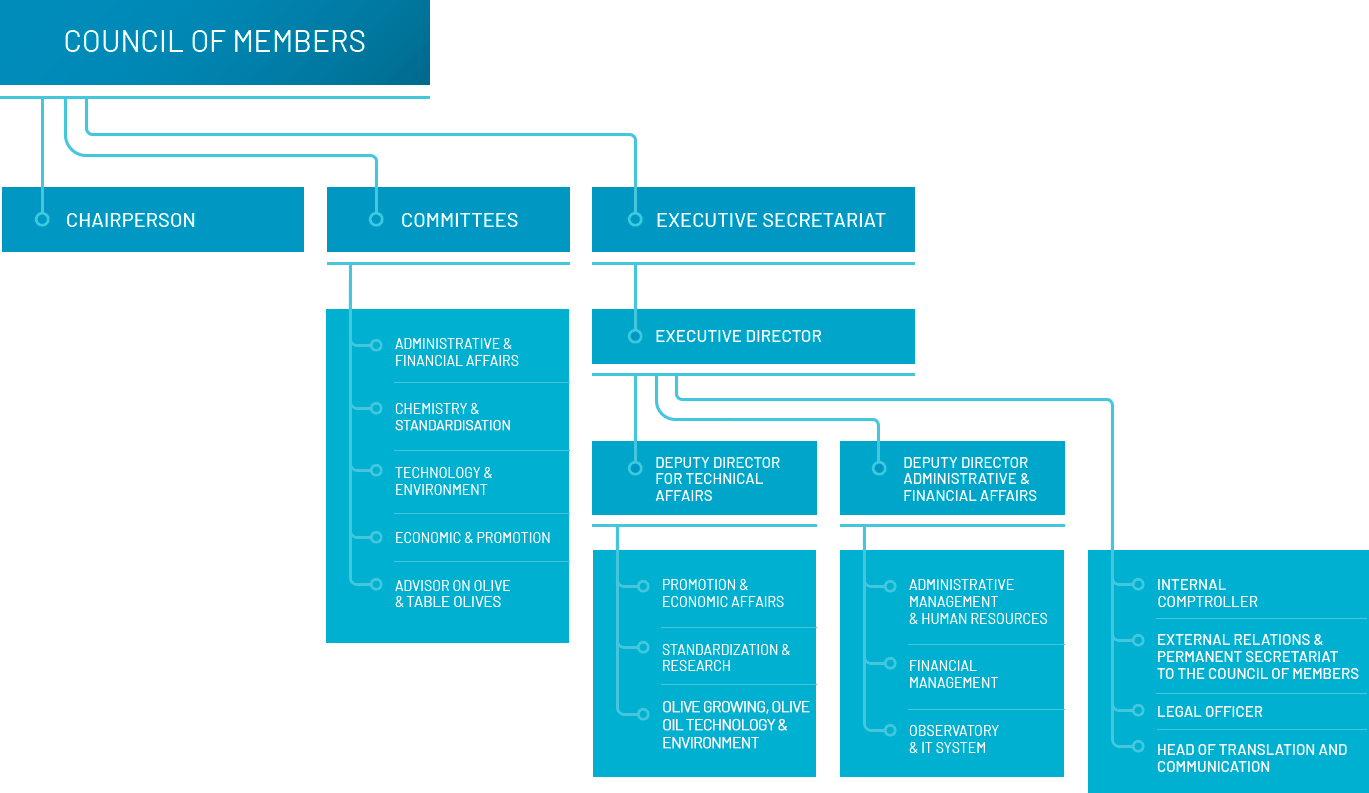About IOC
Structure
The structure of the IOC revolves around the key figures of the Council of Members and its Committees, the Chairperson of the Organisation and the Executive Secretariat.

مجلس الأعضاء
The IOC is governed by the Council of Members, which is its principal decision-making body. The Council of Members is made up of one delegate per Member, who is assisted by alternates and advisers. It meets at least twice a year to review the work carried out by the Organisation and to approve its programme of activities and budget for the next year. The Council of Members takes its decisions by consensus, but when consensus cannot be reached, a mechanism is provided for decision making by a qualified majority. The official languages of the IOC are Arabic, English, French, Italian and Spanish.
الرئيس
The International Agreement on Olive Oil and Table Olives, 2015, provides that the Council of Members shall nominate a Chair for one year from among the delegations of the Members, which is rotated among the IOC Members.
The chairperson plays a vital part in the life of the Organisation and carries out a number of duties, most importantly presiding over meetings and sessions and representing the IOC legally.
A vice-chairperson is also elected each year and succeeds to the chair the following year.
Under the terms of the 2005 International Agreement on Olive Oil and Table Olives the IOC Chair Legally represents the International Olive Council and chairs the sessions of the Council of Members.
 Since January 2025, the Chair of the IOC is held by LYBIA, represented by Walid B D Abuabdalla, Ambassador of Lybia to Spain.
Since January 2025, the Chair of the IOC is held by LYBIA, represented by Walid B D Abuabdalla, Ambassador of Lybia to Spain.
اللجان
The Council of Members can set up as many committees or subcommittees as it needs. The committees do a very important job in discussing and laying the groundwork for proposals and four-year action plans, which are then submitted to the Council of Members. At the moment, there are five committees: the Administrative and Financial Affairs Committee, the Chemistry and Standardisation Committee, the Technology and Environment Committee, the Economy and Promotion Committee and the Advisory Committee on Olive Oil and Table Olives. Except in the case of the Advisory Committee on Olive Oil and Table Olives, the committees are made up of one delegate per Member, plus alternates and advisers.
الشؤون اإلدارية والمالية
The Administrative and Financial Affairs Committee is responsible, in particular, for:

- The annual work programme of the Executive Secretariat for the functioning of the Organisation, namely as regards the budget, financial rules and internal and statutory rules;
- Supervising the implementation of the internal control standards set out;
- Examining the draft annual budget of the International Olive Council proposed by the Executive Director;
- Examining and submitting the accounts for the preceding financial year to the Council of Members for adoption at its first regular session of the calendar year together with any other measure concerning financial and administrative matters;
- Providing advice and recommendations on matters related to the implementation of the Agreement;
- Examining and reporting to the Council of Members with regard to applications for accession or examining with regard to the withdrawal of a Member of the International Olive Council;
- Reviewing compliance with the principles enshrined in article 7 on the appointments of the staff to the Executive Secretariat and other issues related to administrative and organisational matters.
الكمياء و توحيد المعايير
The remit of the Committee is to ensure the implementation of the objectives set out in article 1 (1) of the 2015 Agreement, namely:

- To seek to achieve uniformity in national and international legislation relating to the physico-chemical and organoleptic characteristics of olive oils, olive pomace oils and table olives in order to prevent any obstacle to trade
- To conduct activities in the area of physico-chemical and organoleptic testing in order to add to the knowledge of the composition and quality characteristics of olive products, with a view to consolidating international standards and so enabling:
• Product quality control
• International trade and its development
• Protection of consumer rights
• Prevention of fraudulent and misleading practices and adulteration. - To strengthen the role of the International Olive Council as a forum of excellence for the international scientific community in the area of olive oil and table olives;
- To coordinate studies and research on the nutritional qualities and other intrinsic properties of olive oil and table olives to facilitate the exchange of information on international trade flows.
التكنولوجيا و البيئة
This Committee is responsible for ensuring the implementation of the objectives set out in article 1 (2) of the 2015 Agreement, namely:

- To promote technical cooperation and research and development in the olive sector by encouraging the cooperation of public or private bodies and/or entities, whether national or international;
- To conduct activities for the identification, preservation and utilisation of the gene sources of olive trees;
- To study the interaction between olive growing and the environment, particularly with a view to promoting environmental conservation and sustainable production, and to ensure the integrated and sustainable development of the sector;
- To foster the transfer of technology through training activities in areas connected with the olive sector by organising international, regional and national activities;
- To promote the protection of geographical indications of olive products in compliance with the corresponding international agreements to which a Member may be a party;
- To encourage the exchange of information and experience in the phytosanitary field of olive growing.
الأقتصاد والترويج
The remit of the Committee is to ensure the implementation of the objectives set out in article 1 (3) of the 2015 Agreement, namely:

- To enhance the role of the International Olive Council as a world documentation and information centre on olive trees and their products and as a meeting point for all operators in the sector;
- To promote the consumption of olive products, the expansion of international trade of olive oil and table olives and information on the trade standards of the International Olive Council;
- To support international and regional activities encouraging the dissemination of generic scientific information on the nutritional, health and other properties of olive oil and table olives with a view to improving consumer information;
- To examine the world balances for olive oil, olive pomace oils and table olives, undertake studies and propose appropriate measures;
- To disseminate economic data and analyses on olive oil and table olives and provide Members with the indicators necessary to contribute to the smooth functioning of olive product markets;
- To disseminate and use the results of research and development programmes linked to olive growing and study their applicability in increasing production efficiency.
الاستشارية لزيت الزيتون وزيتون المائدة
The Advisory Committee on Olive Oil and Table Olives is a fundamental talking partner for the Council of Members.

- Its representatives are drawn from all the branches of the olive sector – producers, processors, traders and consumers – in the member countries. The Committee was established to voice the opinions of business circles and to tap into their hands-on knowledge to help the Executive Secretariat find effective solutions to problems and to keep its finger on the pulse of the industry.
الأمانة العامة
The Executive Secretariat is responsible for the day-to-day running of the IOC. Its general brief is to put into practice all the decisions taken by the Council of Members, to use its background knowledge to provide input for IOC programmes and activities and to make the IOC the world centre for documentation and information on olive trees and their produce.
The work of the Secretariat is channelled through the Executive Director, two Deputy Executive Directors, five Units and four independent Departments. Each Unit and Department is responsible for drawing up and implementing its specific activities and for responding to Members’ needs or handling enquiries from the industry or general public.
The IOC is served by a Secretariat headed by an Executive Director, who is assisted by a college of senior officials made up of the Deputy Executive Directors (currently two) and a team of staff members.
The Executive Secretariat is the operative arm of the IOC, implementing its decisions and strategy and serving the needs of its Members. Its target Organisation Chart comprises five Units: The Administrative Management and Human Resources Unit; The Financial Management Unit; the Promotion and Economy Unit; the Standardisation and Research Unit, the Olive Growing, Olive Oil Technology and Environment Unit and the Internal Comptroller Unit in addition to the Office of the Executive Director, the Observatory and Information Systems Department, the Legal Department and the Translation Department.
The Units for Economy and Promotion, Standardisation and Research, Olive Growing, Olive Oil Technology and Environment are under the responsibility of Deputy Executive Director I (Technical Affairs).
The Units for Financial Management and Administrative Management and Human Resources and the Observatory & Information Systems are under the responsibility of Deputy Executive Director II (Administrative and Financial Affairs).
The Internal Comptroller and the Departments for External Relations & Liaison with the Council of Members and Legal Affairs are under the responsibility of the Executive Director.
المدير التنفيدي
The Council of Members elects the Executive Director. The current Executive Director, Jaime Lillo from Spain, took up his appointment on January 1st , 2024.
The Executive Director is responsible for carrying out the tasks incumbent upon him or her in the application of the Agreement and of the rules established by the International Olive Council, as well as for coordinating the Advisory Committee on Olive Oil and Table Olives.
The Executive Director oversees the organisation, administration and supervision of the Executive Secretariat, assisted by the college of senior officials.
Former Executive Directors:
Abdellatif Ghedira (January 2016 – December 2023)
Jean-Louis Barjol (January 2011 – 31 December 2015)
Mohammed Ouhmad Sbitri (November 2007 – 31 December 2010)
Habib Essid (November 2004 – November 2007)
Ahmed Touzani (December 2002 – November 2004)
Fausto Luchetti (October 1987 – December 2002)
Gabriele Luzi (December 1980 – September 1987)
Lucien Denis (November 1962 – November 1980)
Pierre Bonnet (October 1960 – October 1962)
Deputy Executive Directors (DEDs)
The Deputy Executive Directors are responsible for the management of the units they are assigned. They are under the authority of the Executive Director and in direct contact with the committees set up in their sphere of responsibility.
Deputy Executive Directors are considered as “senior officials” and they are members of the “College of Senior Officials” with the Executive Director.
The longest standing DED replaces the ED in his/her absence and performs all the duties concerned.
DEPUTY EXECUTIVE DIRECTOR FOR TECHNICAL AFFAIRS (DED1)
The Council of Members elects the Executive Director. The current Deputy Executive Director I, Abderraouf Laajimi of Tunisia, took up his appointment on 1 July 2024. The Units for Economy and Promotion, Chemistry and Standardisation, Olive Growing, Olive Oil Technology and Environment are under the responsibility of Deputy Executive Director I (Technical Affairs).
Economic & Promotion Unit
The Economic & Promotion Affairs Unit is in charge of drawing up and implementing IOC promotional policy and activities and of producing promotional publications and material.
PROMOTIONAL ACTIVITIES
- IOC promotion is largely carried out through a grant funding programme and through campaigns proper.
- In the first case, the Division runs two schemes for the award of grants. The first is for generic promotional and scientific events (trade fairs, exhibitions, food demonstrations etc.) held in traditional producer and consumer countries. The second is geared towards providing financing for national programmes to promote local consumption of olive oil and table olives in producer IOC member countries which are not Members of the European Union.
- In the second case, the Division oversees educational promotion campaigns on new emerging markets characterised by fast growing economies, very large populations and high market potential for food consumption, particularly of olive oil and olives.
PUBLICATIONS
- The Division produces a range of information: leaflets, booklets, an official magazine (Olivae, available in Arabic, English, French, Italian and Spanish), videos, … – for release during campaigns, at promotional events and in response to enquiries from the general public.
OTHER
- This unit also responsible from tasks such as organising media tours of olive growing countries for specialist journalists, representing the IOC at events in general and hosting stands at trade fairs to mention just a few.
ECONOMIC ACTIVITES
- Preparation of working documents describing and analysing economic conditions on the olive oil and table olive markets, which are then examined by the IOC at its sessions.
- Carrying out of market research and other economic analysis and statistical work on the olive/olive sector requested by the IOC Members.
- Updating and processing the IOC statistical database on the world markets for olive oils, table olives and for other fluid edible vegetable oils and fats.
- Reviewing market conditions.
- Tracking olive oil and table olive imports by the countries where the IOC conducts promotional activities.
- Conducting retrospective and prospective studies on the olive oil and table olive market.
Standardisation and Research Unit
This is a crucial area of IOC work broadly spanning the constant development or updating of chemical and sensory testing methods for olive oils and table olives for inclusion in the IOC trade standards and the harmonisation of international standards or regulations. The Division also runs a prestigious recognition scheme for olive oil chemical and sensory testing laboratories and organises the IOC Mario Solinas Quality Award, an annual international award for excellence in the production of extra virgin olive oil. The general aim of this Unit, according to the 2015 International Agreement on Olive oil and Table Olives, are the followings:
- To seek to achieve uniformity in national and international legislation relating to the physico-chemical and organoleptic characteristics of olive oils, olive pomace oils and table olives in order to prevent any obstacle to trade;
- To conduct activities in the area of physico-chemical and organoleptic testing in order to add to the knowledge of the composition and quality characteristics of olive products, with a view to consolidating international standards and so enabling: • Product quality control; • International trade and its development; • Protection of consumer rights; • Prevention of fraudulent and misleading practices and adulteration.
- To strengthen the role of the International Olive Council as a forum of excellence for the international scientific community in the area of olives and olive oil;
- To coordinate studies and research on the nutritional qualities and other intrinsic properties of olive oil and table olives;
- To facilitate the exchange of information on international trade flows.
Olive Growing, Olive Oil Technology & the Environment Unit
This is a significant subject for the members in terms of improvement their capacities and raise the quality. The general aim of this Unit, according to the 2015 International Agreement on Olive oil and Table Olives, are the followings:
- To promote technical cooperation and research and development in the olive sector by encouraging the cooperation of public or private bodies and/or entities, whether national or international;
- To conduct activities for the identification, preservation and utilization of the gene sources of olive trees;
- To study the interaction between olive growing and the environment, particularly with a view to promoting environmental conservation and sustainable production, and to ensure the integrated and sustainable development of the sector;
- To foster the transfer of technology through training activities in the fields connected with the olive sector by organizing international, regional and national activities;
- To promote the protection of geographical indications of olive products in compliance with the corresponding international agreements to which a member may be a party;
- To encourage the exchange of information and experience in the phytosanitary field on olive growing.
RESEARCH & DEVELOPMENT ACTIVITIES
- R & D work is mainly channelled through the development and implementation of technical projects, often in partnership with the Common Fund for Commodities or other institutions, designed to transfer technology.
TRAINING
- Training activities include the organisation of international courses, national seminars and workshops, inhouse training opportunities at top European research centres, scholarships for post-graduate studies.
TECHNICAL ASSISTANCE ACTIVITIES
- On request, the Technical Unit arranges field trips to visit olive orchards and processing facilities and research centres for groups from the member countries. It also arranges for experts to visit any member countries requiring consultancy services to deal with specific problems.
- The Unit also publishes the information generated by its activities in addition to handbooks and CDs on subjects like production techniques in olive growing or olive nursery production.
Deputy Executive Director for Administrative & Financial Affairs (DED2)
The Council of Members elects the Executive Director. The current Deputy Executive Director II, Imdat Pekdemir of Türkiye, took up his appointment on 1 July 2024. The Units for Financial Management and Administrative Management and Human Resources and the of Observatory & Information Systems are under the responsibility of Deputy Executive Director II (Administrative and Financial Affairs).
Administrative Management & Human Resources Unit
Its main functions are the administrative management of all the staff of the Organisation, the implementation of human resources management policy, staff support, advice and information of staff, the management and supervision of resource allocation in terms of jobs and payroll; the coordination with Executive Secretariat team and support for the performance of activities; the management and monitoring of the budget and four-year plan and the management and supervision of movable and immovable property and stocks.
Financial Management Unit
This unit is responsible for the management and monitoring of the IOC Budgets. It prepares the Financial Statements of the Organization and manages the treasury of the Institution.
Is responsible, moreover, for:
- Ensure smooth operation of budgetary accounting, cash flow management and financial accounting.
- Manage treasury and petty cash payments.
- Establish and validate accounting systems and methods.
- Coordinate activities relating to the preparation of the annual budget and four-year plan.
- Coordinate the accounting entry of transactions and commit payments.
- Coordinate the preparation of the financial statements.
- Manage and safekeep accounting and financial documents, including the register of exceptions.
- The budget and financial rules.
- The draft annual budget of the International Olive Council proposed by the Executive Director.
- Examining and submitting the accounts for the preceding financial year to the Council of Members for adoption at its first regular session of the calendar year together with any other measure concerning financial matters.
- Examining and reporting to the Council of Members with regard to applications for accession or examining with regard to the withdrawal of a Member of the International Olive Council.
Observatory & Information Systems Department
OBSERVATOR (DOCUMENTATION) AND INFORMATION
- Put in place and administer collaborative information platform.
- Coordinate information, data and indicators.
- Ensure compliance with deadlines for supplying platform input.
- Coordination of the monthly newsletter and the online journal OLIVAE.
- Dissemination of information.
INFORMATION SYSTEMS
- Administer the servers and computer networks, manage client workstations and ensures software and information system upgrading.
- Administer IOC website.
- Put in place IT security procedures and ensure compliance with the IT charter.
- Help users with the IT environment.
- Help to keep track of technological developments and ensure the application of New Information and Communication Technologies (NICT) at the IOC.
- Liaise with suppliers and IT service providers.
Internal Comptroller
The Internal Comptroller is in charge of the ex-ante control of all financial transactions and verifies the manner in which the funds and assets of the IOC are managed. S/he also puts forward recommendations for changes to rules and workflow with the objective of mitigating risks and optimizing processes. The result of these activities, among others, is reported to the Council of Members.
External Relations & Liaison with the Council of Members Department
External relations: Liaise with non-member States and international organisations and institutions; Maintain diplomatic relations with IOC partners and Promote the image of the IOC to outside talking partners.
Liaison with Council of Members: Liaise with the official representatives of IOC Member States; Organise Council meetings, circulate reports, draft minutes and monitor follow-up on decisions; File Council reports, minutes and decisions and Act as webmaster of the website areas for Heads of Delegation and delegations.
Legal Office
Partnerships and support: Advise the IOC structures (Council of Members, ES committees, etc); Draw up and monitor template agreements; Draft strategic contracts and specifications and File agreements and contracts.
Litigation and general rules and regulations:
Manage pre-litigation: Coordinate and monitor IOC interests in court cases and Monitor enforcement of judgments.
General rules and regulations: Ensure fulfilment of legal obligations, particularly contracts; Identify legal problems and propose solutions; Propose the review of procedures entailing legal risks; Ensure legal oversight of all rules and regulations and case law and File legal dossiers and circulate information.
Translation Department and Communications
Coordination services: Coordinate response to in-house and external translation and other language-related needs; Oversee management of external translation services and in-house CAT tools and Assist with administrative aspects of translation-related affairs.
Translating services in an IOC working language different to that of the translator: In-house language services: translating, editing, proofreading, drafting.
External language services: participate in the management of external translation services and develop CAT dictionaries.
Communications activities: Draw up communications strategy and follow up as media relations focal point; Draft IOC activity reports and Draft ED activity report.
 The Chair of the IOC in 2019 (January–December) was held by Egypt, represented by honorable Ezz El Din Abu Steit, Minister of Agriculture of Egypt
The Chair of the IOC in 2019 (January–December) was held by Egypt, represented by honorable Ezz El Din Abu Steit, Minister of Agriculture of Egypt
